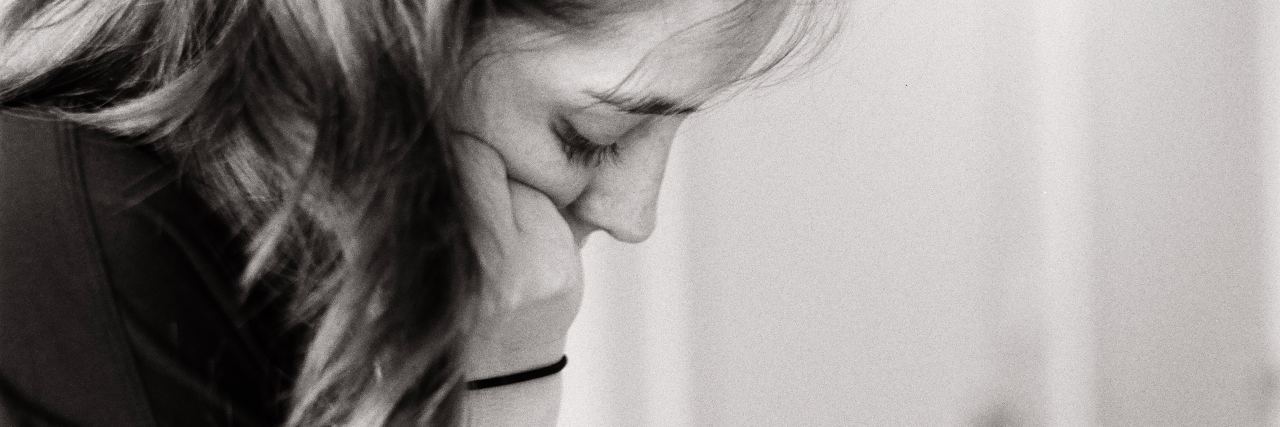How I Realized My Mental Illness Was Actually Making Me Lonely
Editor's Note
If you experience suicidal thoughts, the following post could be potentially triggering. You can contact the Crisis Text Line by texting “START” to 741741.
I think back to my life before everything went a bit tits-up and the overwhelming thing that strikes me is how lonely I was back then. I didn’t realize it at the time, but the combination of my deteriorating mental health and my denial and inability to seek or accept help meant I was incredibly isolated.
My way of dealing with the downward spiral of depression and undiagnosed complex post-traumatic stress disorder (C-PTSD) was to suppress everything I was feeling and pretend like it wasn’t happening. For the most part, it worked. For a while. I stayed functional, I held down a demanding full-time job, I made and kept plans, kept up with playing sports and most of all I managed to put on a brave face. I told myself again and again that I was overreacting to my problems, and if I reached out for help, I would be seen as attention-seeking.
Most important to me was to keep a sense of control of myself and my feelings. If I was in control of my emotions, then I figured I could keep the façade up and keep on functioning. I hated the idea that it could be the other way round; my mental health could be in control of me. I had a whole range of maladaptive coping mechanisms to help keep control; denial and self-harm were my main go-tos. When my feelings started to overwhelm me, I gave myself hell and invalidated those feelings. If that didn’t work, and I continued to feel control slipping through my fingers, I turned to self-harm as a way to turn the pain into something I could harness and regulate.
Very occasionally, the pain would get too much and it would spill out in the middle of the night to a loved one in an incoherent (and usually inebriated) ramble. Embarrassed, the next morning I’d retreat back inside myself and firmly slam the shutters closed. I’d even go as far to then set myself challenges; I’d tell myself I wasn’t allowed to lean on a certain person for support for a certain number of weeks. I felt people’s love and patience for me was a finite resource, and by sharing my problems I’d already used up far too much of it.
Fast-forward to the present, and I’m now well-known to mental health services and receiving a good level of support. My loved ones are now fully aware of my past traumas, my diagnoses and, above all, have developed a good working understanding of my day-to-day lived experience. I am coming round to the idea that their love is unconditional and I can’t “use it up.” I am getting fantastic support.
And it’s nothing short of terrifying. My life, my problems, my entire sense of self now feels messy and uncontrolled. I no longer have a vice-like grip on my emotions, no longer able to keep everything under people’s radar. At first, I fought hard to get this control back. I tried to push away my loved ones, thinking if I could slam the lid back on my problems, I would keep them safe from the fallout. I sunk so deep into self harm that I ended up in the emergency department, when I was already an inpatient on a psychiatric ward.
None of it worked. The cat was already out of the bag. No way to shut Pandora’s box once it had been opened. So I stopped trying.
Then, something amazing happened; I suddenly realized I didn’t feel alone. This was quite a revelation as I didn’t even realize I was lonely. In the same way you don’t appreciate breathing freely until you have a blocked nose, I didn’t appreciate just how isolated and alone I’d been until I realized I no longer felt like that. Other people’s love went from something I was aware conceptually existed, but couldn’t completely trust, to something I unequivocally knew and felt to be true and genuine. When I first became ill, I would have given everything to push everyone out, to claw the control back that I so desperately craved. Now, in a 180 so monumental I often wondered how it happened, I’m OK with not being in control. It still doesn’t sit comfortably, and maybe it never well, but it’s worth it because I’m no longer alone.
Photo by Matt Antonioli on Unsplash

